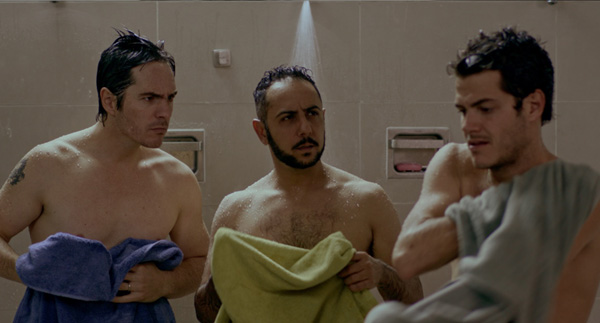
BY GARY M. KRAMER | Hazlo Como Hombre” (“Do It Like a Man”) comically satirizes Mexican machismo by depicting the gay and straight identities of three buddies. Santi (Alfonso Dosal), Eduardo (Humberto Busto), and Raúl (Mauricio Ochmann) are best friends. However, the dynamic among the guys changes when Santi comes out — during a group shower, no less. Eduardo, who cuts hair at a hipster barbershop, couldn’t be prouder of his friend. Raúl, however, is much less supportive — and not just because Santi is breaking off his engagement to Raúl’s sister, Nati (Aislinn Derbez). Raúl expresses insecurity and homophobia as a result of his friend’s disclosure, and his fears are the basis for much of the film’s over-the-top humor.
“Hazlo Como Hombre” respectfully depicts Santi adjusting to his new queer life, and it uses broad comedy to show Raúl recalibrating his life and emotions now that Santi is openly gay. Caught between them — and creating a kind of balance — is Eduardo. What transpires among the three friends and their love interests forms much of the film’s comedy. And along the way, macho characters find themselves deflated in the face of “maricóns.”
“Hazlo Como Hombre” has fun with a trio of buddies dealing with one of them being gay
Taking this approach may be why the film — this summer’s box office blockbuster in Mexico from Chilean director Nicolás López — has the opportunity to change minds. We chatted via Skype with actor Humberto Busto about the appeal of “Hazlo Como Hombre.”
GARY M. KRAMER: Why do you think “Hazlo Como Hombre” has been such a runaway success in Mexico?
HUMBERTO BUSTO: Mexico has a long tradition of machismo. Films featuring gay people made them funny or ridiculous and not the main character. We are having a moment in Mexico where there is a lot of social change, and people want to be free. It’s gay-friendly. The taxis are pink. But there is a kind of macho quality in every Mexican where they joke about being a “maricón,” or say, “Don’t be a puta.” The new generation has a different idea about gay people, and the people seeing this film feel a relief to be part of a different Mexico. They have a different feeling toward the gay community.
GMK: What has the reaction been from the queer community in Mexico?
HB: We worried about the LGBT community not liking the film because they might think it would be bad toward their community. But gay people recognize themselves in the film. They are contacting us and saying, “I took my homophobic cousin, and he talked with me about my being gay,” or “I came out to my parents after seeing this film.” Or, “I took my parents to see the film.” The film provides an intelligent way to talk about this topic of sexuality in a non-serious way. I think it’s better to make people think by laughing than being so serious about it. And the director wanted an exaggerated tone and extreme personalities that weren’t as subtle or realistic as most Mexican films. It has a farcical way of portraying the characters and situations.
GMK: Speaking of parents, what did your mother think of the film?
HB: I took my mother to the premiere. She’s from a tiny town in Mexico. She was laughing so fucking loud she started to cough. I thought she was going to have a stroke! That the film was so funny to a conservative Mexican woman was good.
GMK: Can you talk about the film’s ideas about acceptance?
HB: The main idea is that who or what you desire is not as important as friendship. Love and friendship are above any sexual orientation, and if you don’t open or change your mind in a society about how to be and how to connect with others, you can miss an opportunity to connect in a real way. Mexico is having difficulties with violence, so it’s necessary for us to remember we need to love and respect everyone.
GMK: What I like about the film is that it is naughty, with talk about anal sex and a dildo gag, but never goes too far. Was the humor designed to make the film both risqué and family-friendly?
HB: We really wanted to make a film that felt very familiar. We didn’t want to insult anyone or make them feel so uncomfortable that they wouldn’t want to watch. We made the decision to put famous Mexican actors in the film because they connect with family audiences. When we see Aislinn with the dildo it could be a bad image, but she’s so charming and beautiful that it was ugly and cute at the same time. We tried to make the art and sets and costume bright and colorful and affable.
GMK: What examples or experiences do you have with machismo in Mexican culture?
HB: I’m not a macho in that sense. I hate that in Mexico we are still discussing gay marriage. I’ve been living in Berlin, and it’s a very orgiastic and extreme there. When I get back to Mexico, we discuss things that were discussed a long time ago in different countries. What will happen with HIV and transgender people in Mexico if we are still talking about gay marriage? We need to talk about more important things in the world. This film is like a punch in the face to speed the process of understanding things in a new or different way.
HAZLO COMO HOMBRE | Directed by Nicolás López | Pantelion Films | In Spanish with English subtitles | Opens Sep. 1 | AMC Loews 34th Street, 312 W. 34th St. | amctheatres.com


























